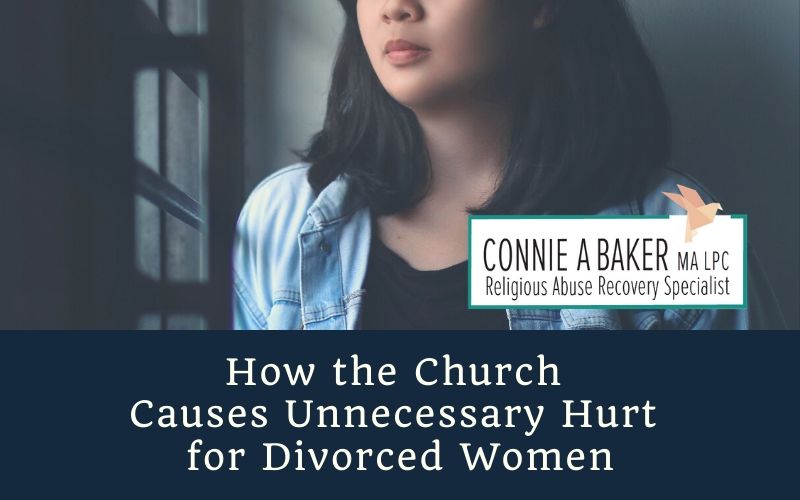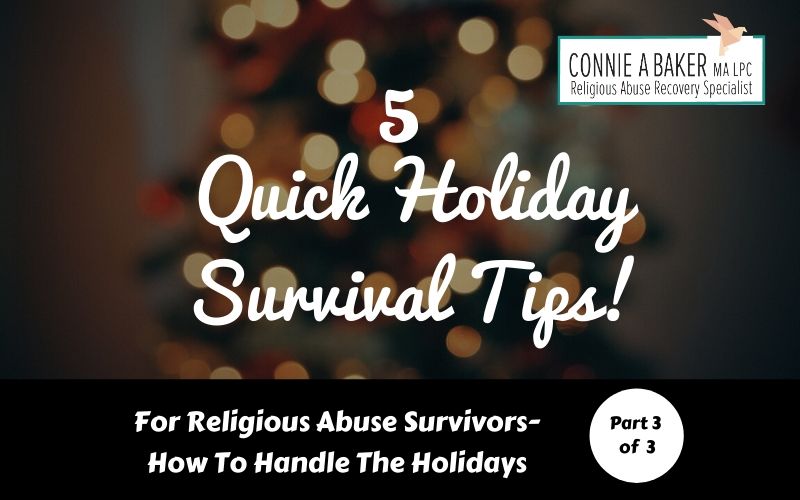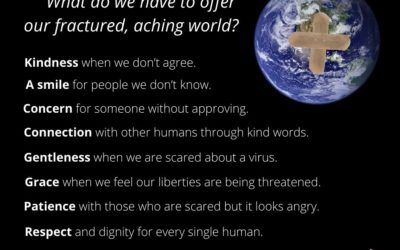I remember Sarah vividly. She was a loving mother of 2 boys and was a vibrant and productive member of a church who had her fingers in a wide variety of ministries. She was a high-profile member whose name was easily recognized by other members. Her husband Rick was a very charming man—well-liked and respected.
But the outward picture did not match the truth.
Sarah’s husband was abusive.
When their marriage began to fall apart, she went to the church leadership for help. The leadership questioned whether Sarah was telling the truth about the abuse. Rick seemed like “such a nice guy”. As the marriage deteriorated, Sarah felt less and less safe in the church where she had given her heart and soul. She decided to divorce.
In the midst of her divorce, Sarah became very sick with an autoimmune disease. This season of her life devastated her physically, emotionally, financially—in every way. She was no longer a part of her long-term church community. Long-term friends stopped calling. Sarah was no longer invited to social gatherings. Her support disintegrated, and she was left to manage her circumstances without the group that she had bonded to and willingly served for so many years.
The primary factor in the disintegration of her support was the divorce. People were uncomfortable with it. People felt they needed to understand whose “fault” it was. Did she really do everything she could to save the marriage?
It’s hard to overstate the challenges that divorced women face in many religious systems. Divorced men have unique challenges in church organizations as well, but in my observations, women tend to suffer more dismissal, stigma and loss in a religious setting than men do. Here are some factors:
- Social pressure: Rarely do divorced women remain in the same religious body post-divorce. Even when it’s understood that a woman wasn’t “at fault” in the divorce, she may find herself facing a subtle (or not so subtle) disapproval or being pushed toward the margins. Divorced women simply disappear in many cases and never return to their home church. They almost always lose status – most religious organizations give status to married women (for no justifiable reason).
- Financial pressure: Especially in socially conservative faith traditions (often due to high emphasis on motherhood and patriarchy), many women find themselves burdened with financial obligations that they weren’t prepared for. They may be forced to seek employment (for a less than livable wage) for the first time after years of raising children, she or they may find themselves stuck with legal fees or debt as a result of the divorce.
- Shame: Because divorce has been preached against so loudly and publicly, even when a woman leaves a marriage due to adultery, addiction, or abuse, she experiences an overwhelming shame if divorced. Women fear that, like Sarah, they won’t be believed or that their experiences will be minimized, or they simply bear too much personal shame to discuss these topics with even the closest friends.
- Blame: One client of mine told me that when she told people in her workplace about her divorce, the response was, “I’m so very sorry. Can I help?” When she told people at her church, the response was, “What happened?” (Read: “I need to personally determine, with less than adequate information, who was at fault in the divorce.”) Those of us in religious systems know that often the woman is made disproportionately responsible for the demise of a marriage. There’s some type of need for many inside conservative religious settings to assign blame or fault at a time when what’s really needed most is support, aid, and comfort. Many women just don’t want to face the blame game.
- Expectation of God’s punishment: One of my very best friends went through a divorce from an abusive man. She had been high profile in her very large church. About a year later she ran into a woman from the church at a coffee shop. The woman approached my friend with a “oh you pitiful thing” sort of expression and said, “How are you doing, Ruth?” It was clear that the expected answer would be, “Oh, I’m hanging in there – not doing very well”. But Ruth said, “Great! Life is going well!” The woman walked away stunned. It was clearly against “the rules” for Ruth to be doing well after a divorce. She should be suffering due to her “sin”.
For many women in the midst of divorce, faith communities often do more harm than good. At the point these women are the most desperate for social, relational, and financial support, it is jerked out from under them. They are going through one of the scariest, most devastating, guilt-inducing life events possible, and they end up struggling and grieving, isolated and alone. One writer put it this way:
…I realized God had other plans besides restoration and I started to follow those plans. The same week I shared what I thought was my brighter future, as a divorced woman, two of the church ladies (which included the Pastor’s wife) deleted and blocked me as ‘friends’ on Facebook. I couldn’t even contact them to see if I had done something wrong. They never brought anything to my attention nor spoke to me again. They just avoided me. *
Most religious communities could do a much better job of supporting, nurturing, and comforting those experiencing the loss of a marriage.
But the good news is that divorce doesn’t have to signal the end of community, connection, or growth. Kate was a mother of three girls stuck in an unhealthy marriage when she first came to see me. In the course of our work together, Kate eventually came to realize the severity of the abuse she suffered in the marriage and the extent of her husband’s addiction. When she was eventually free of her abusive marriage, Kate began to exercise her individuality more. She drew better boundaries, grew stronger and more capable, and eventually realized that she could protect herself. While the death of her marriage was not easy, the freedom from abuse and her husband’s addiction began a journey toward strength and capability that has now resulted in a host of healthy relationships for Kate and even a return to a different church that loves and supports her and her girls.
How can you find some support and community when you’ve been shunned by your faith community?
First, I will say that it is rarely easy. Religious organizations – for good or for bad – know how to do community like no other. Regular meetings, common world view and working for a cause make churches a hotbed for community. That said, community can be found in other creative arenas. Consider some of the following options:
- Hobby/interest communities: Whether it’s fiber arts or a gym class or a library book club, there are dozens of free or very inexpensive community groups that have no faith affiliation. Find one that speaks to your needs and personality.
- Work groups: If you are employed, make an effort to connect with people in your workplace. It often doesn’t take much; a simple request to join someone for lunch can lead to good connections—sometimes with people who’ve always wanted to talk with you!
- Neighbors/neighborhood groups: It can be excruciatingly difficult to reach out to neighbors in difficult times, but it could be that your neighbors really do care about you and would like to connect with you. Try to strike up a conversation at the mailbox. It may start a friendship you’ll always cherish.
- New faith communities: Often there is a shift of faith (to some degree) when a person walks through something as life altering as a divorce. There are a wide variety of faith communities that might differ theologically, culturally or politically from the one you left but fit you well now and be nurturing to your spirit and relationships.
If you have experienced the loss of your faith community due to a divorce or other traumatic life event, it’s possible you’ve been a victim of religious abuse. Have you experienced something like this? I have a private Facebook group, Overcoming Religious Abuse Community (Join Here) that I would love for you to join to receive support and encouragement.
My new book “Traumatized by Religious Abuse-Courage, Hope and Freedom for Survivors” (Read Here) would also be a source of help and encouragement.
*Grice, Jen. “(Divorced Women) Shunned by the Church.” Surviving and Thriving After Divorce with Jen Grice. https://jengrice.com/divorced-women-shunned-by-the-church/







Thank you, Connie, for quoting my article and linking it here. Many women experience this and it’s great to know there are resources like us out there to help them get through this hard season. God bless!
I realize that this article was written for women so it is not my intention to throw shade. I do want to point out that my experience as a man does not square with the assertion that women are more negatively affected than men (my interpretation).
The church was everything to me until my ex-wife left after 37 years. Then, the silence of people I believed to be friends and the church leaders became deafening. The church members were all about completing a balance sheet to figure out who was the most guilty. I was so devastated that I wasted a great deal of time engaging in the fault-finding process–the blame game. I believe the church’s role should have been to suppprt marriage, not try to figure out whose fault it was. Just to be clear, I can only speak for myself [I make no claims or accusations for her side.] that there were no issues where churches make exceptions to the permanency of marriage–abuse (emotional, physical or verbal), unfaithfulness, substance abuse.
It’s been 5 years since this happened and I haven’t been back to any church. I just can’t seem to find any value in it any longer after the experience. When I experienced a life crisis, the church disappeared like a mirage in the desert. Very sad, completely disallusioning, and devastating.
Thank you so much for sharing your perspective and your experience. I am so very sorry for what you have gone through in your marriage and in the church. Disillusioning and devastating are 2 powerful words to describe what so many go through. You are not alone.
Hello, wondering how common this is.i was shocked by the treatment from Christians after divorce…some of them having gone through their divorce with them….wow!!! WHAT WAS THAT?…..I moved out of the area 1000 miles away….hard to really connect with anyone so far… .after 3 years